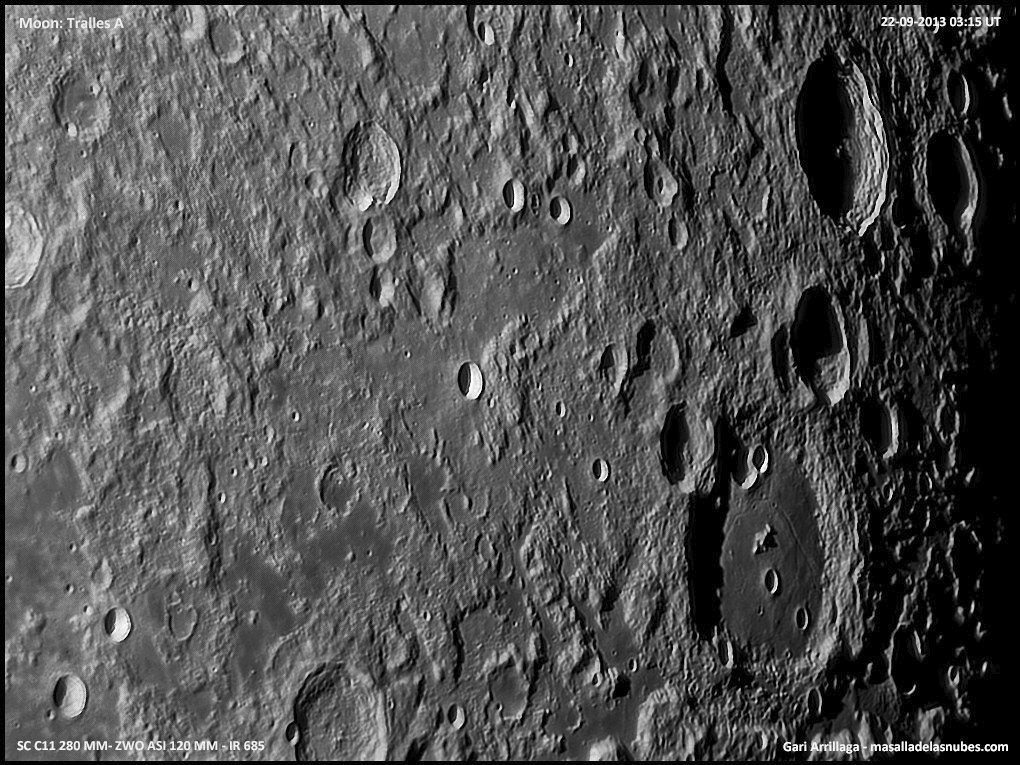Difference between revisions of "October 8, 2013"
| (One intermediate revision by the same user not shown) | |||
| Line 6: | Line 6: | ||
<em>image by [mailto:gari@adbooth.net Gari Arrillaga], Tarragona, Spain</em><br /> | <em>image by [mailto:gari@adbooth.net Gari Arrillaga], Tarragona, Spain</em><br /> | ||
<br /> | <br /> | ||
| − | It is rare for a terrestrial image to reveal the delicate rilles that cross the floor of [ | + | It is rare for a terrestrial image to reveal the delicate rilles that cross the floor of [https://the-moon.us/wiki/Cleomedes Cleomedes] but since we have seen them [http://www2.lpod.org/wiki/August_4,_2013 twice] this year let's talk of something else. The [https://the-moon.us/wiki/Cleomedes Moon-Wiki] includes three depth measures for Cleomedes: 3.4 - 4.5 km by Boint, 3.86 km by Westfall and 4.35 km by Cherrington. Using the altimetry tool within the [http://bit.ly/17cGZLT LRO QuickMap] I determined which is correct. They all are. I measured the following rim to floor depths: N wall: 3.74 km, E wall: 4.20 km, S wall: 2.65 km, and W wall: 5.00 km, giving an average of 3.98 km. Westfall closely matches the average of my four cardinal measurements, Boint covers the two median values, and Cherrington is right for the two highest values. Now I know from when I measured shadow lengths on Lunar Orbiter IV photos that commonly measures are of just one wall height, the longest shadow and highest value, in which case Cherrington was best. I measured in four places which probably gives a reasonable average, but if 8 or 12 or 100 places were measured it would be a better average. Larger craters don't have a single depth, and most prior measurements were probably of the longest shadow and thus a maximum. The height of the middle central peak is 1.05 km and 1.25 km, measured in orthogonal directions; quite close to the value of 1 km measured by Sekiguchi on half tone prints of the <em>Photographic Lunar Atlas</em>! The agreement between spacecraft measures and 20-40 year old amateur values is heartening but I doubt if it is a generally rule. So far, we still only have old values for crater depths and peak heights with LRO derived values only for a handful of craters. Perhaps a computer program will be developed to automatically measure all crater depths and peak heights - as has been done for crater diameters - but right now there is an opening for amateurs to do the job. One more thing, the lowest places on Cleomedes' floor are around its edges - the crater floor is domed about 230 m. Another feature on Gari's image caught my eye, looking like an artifact - its not. Tomorrow we'll see what an oddity it is.<br /> |
<br /> | <br /> | ||
<em>[mailto:tychocrater@yahoo.com Chuck Wood]</em><br /> | <em>[mailto:tychocrater@yahoo.com Chuck Wood]</em><br /> | ||
<br /> | <br /> | ||
<strong>Related Links</strong><br /> | <strong>Related Links</strong><br /> | ||
| − | <em>[ | + | <em>[[21st Century Atlas of the Moon|21st Century Atlas]]</em> chart 1<br /> |
Gari's [http://masalladelasnubes.com website]<br /> | Gari's [http://masalladelasnubes.com website]<br /> | ||
<br /> | <br /> | ||
Latest revision as of 07:36, 28 October 2018
Too Far To Jump

image by Gari Arrillaga, Tarragona, Spain
It is rare for a terrestrial image to reveal the delicate rilles that cross the floor of Cleomedes but since we have seen them twice this year let's talk of something else. The Moon-Wiki includes three depth measures for Cleomedes: 3.4 - 4.5 km by Boint, 3.86 km by Westfall and 4.35 km by Cherrington. Using the altimetry tool within the LRO QuickMap I determined which is correct. They all are. I measured the following rim to floor depths: N wall: 3.74 km, E wall: 4.20 km, S wall: 2.65 km, and W wall: 5.00 km, giving an average of 3.98 km. Westfall closely matches the average of my four cardinal measurements, Boint covers the two median values, and Cherrington is right for the two highest values. Now I know from when I measured shadow lengths on Lunar Orbiter IV photos that commonly measures are of just one wall height, the longest shadow and highest value, in which case Cherrington was best. I measured in four places which probably gives a reasonable average, but if 8 or 12 or 100 places were measured it would be a better average. Larger craters don't have a single depth, and most prior measurements were probably of the longest shadow and thus a maximum. The height of the middle central peak is 1.05 km and 1.25 km, measured in orthogonal directions; quite close to the value of 1 km measured by Sekiguchi on half tone prints of the Photographic Lunar Atlas! The agreement between spacecraft measures and 20-40 year old amateur values is heartening but I doubt if it is a generally rule. So far, we still only have old values for crater depths and peak heights with LRO derived values only for a handful of craters. Perhaps a computer program will be developed to automatically measure all crater depths and peak heights - as has been done for crater diameters - but right now there is an opening for amateurs to do the job. One more thing, the lowest places on Cleomedes' floor are around its edges - the crater floor is domed about 230 m. Another feature on Gari's image caught my eye, looking like an artifact - its not. Tomorrow we'll see what an oddity it is.
Chuck Wood
Related Links
21st Century Atlas chart 1
Gari's website
Yesterday's LPOD: Not Quite Crypto
Tomorrow's LPOD: Side-Squashed
COMMENTS?
Register, Log in, and join in the comments.



